
YouTube is a well-known video-sharing website that allows users to watch, like, comment on, and create videos. The video can be seen on a desktop, tablet, PC, mobile phone, or laptop.
Online YouTube playlist downloader facilitate mass video downloads. This covers both offline videos and a playlist you’ve made yourself. Many software exist to assist you download videos from YouTube in a variety of formats, including MP3 and MP4. They provide high-quality video while saving you time.
How To Download A Youtube Playlist?
If you’re a big fan of YouTube and its content, it’s likely that you’re using the playlist tool to save your favourite videos for later viewing. However, streaming videos costs bandwidth and can be incredibly inconvenient if your Internet connection is slow.
Fortunately, there are YouTube Video Downloading tools on the market that can help you out in such a situation. What do you do, though, when you have to download your entire playlist? You can choose to download it one by one, but this will take a long time. If only there was software that allowed you to download your favourite YouTube playlist in bulk with just one click.
Well, you may relax knowing that there are applications specifically developed to assist you in downloading your YouTube playlist without difficulty.
What Is YouTube Playlist Downloader?
It’s a software that allows you to download videos in bulk from your YouTube account. This includes videos you’ve saved offline as well as playlists you’ve made yourself.
Although there are numerous software solutions that may help you download videos from YouTube, there are only a few that can help you download videos in bulk, thereby saving you time.
We’ll showcase the greatest of these technologies in this piece, which help make video downloading more accessible.
The following is a hand-picked list of the greatest download YouTube playlist downloaders, along with their most popular features and web addresses. This list includes both free and paid software, both open source and commercial.
Top 20 Best Free YouTube Playlist Downloader Online
1. Airy
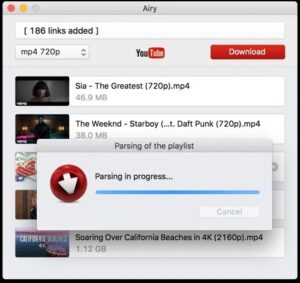
Airy is one of the best YouTube playlist downloaders, allowing you to save videos in a variety of formats such as FLV and 3GP. Browsers such as Firefox, Google Chrome, Internet Explorer, and others can also be used to integrate it.
Features:
- It allows you to choose your favourite video quality.
- You can send videos to your friends via email.
- You may use the airy tool to add several download links for clips.
- It has a user interface that is proactive.
- Windows and Mac are supported platforms.
2. Snapdownloader

Snapdownloader is a programme that allows you to videos mp3 download YouTube in resolutions up to 8K. It allows you to watch clips even when you are not connected to the internet. You can easily convert youtube playlist to mp3 videos to MP4 or MP3 with this tool.
Features:
- It aids in the storage of a YouTube playlist converter.
- More than 900 websites are supported.
- Download videos at the same time.
- Save videos without any restrictions.
- Your downloads can be scheduled.
3. Softorino YouTube Converter
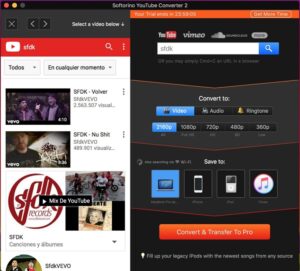
Softorino is a leading YouTube to mp3 playlist Downloader that allows you to download and convert any video in just one click. It lets you convert videos to MP3, MP4 for use on any Apple device, including the iPhone.
Features:
- The reference website was automatically detected by Softorino YouTube to mp4 hd Converter.
- This app allows you to search for and copy the link to any YouTube 2 mp4 video without having to install anything.
- It offers an easy-to-use UI.
- Wi-Fi allows you to quickly send downloaded videos to your iPad or iPhone.
- This software can recognise metadata on its own.
- You can also get videos from over 60 different websites.
- Windows, iOS, and Mac are all supported platforms.
4. Itubego

Itubego is a piece of software that allows you to save YouTube playlists. This device includes a YouTube converter that can convert video 2 MP3, MP4, 4K, and HD MP4 formats. Many audio and video formats are supported by this programme.
Features:
- If you download any video, Itubego will automatically look for subtitles for TV shows and movies on the internet.
- The programme allows you to store a large number of clips at once.
- Convert video to more than 40 different formats, including mov, Avi, mp4, Mkv, and others.
- It allows you to download high-quality films from over 10,000 different websites.
- Windows and Android are supported devices.
5. TubeMate MP3 YouTube downloader

Tubemate is a playlist that allows you to download videos from YouTube playlists. It allows you to save the video to an SD card or a specific folder. You can change the download speed in the app.
Features:
- It can help you switch to a different language.
- If you make a mistake when changing the language, you may easily undo it.
- You can use the tool to pause and resume your downloads.
- It offers an easy-to-use UI.
- On your PC, you can save numerous videos.
- Windows and Mac are supported platforms.
6. Snaptube
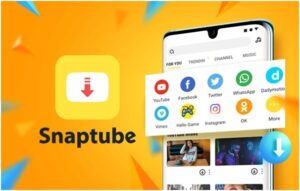
Snaptube is an application that allows you to save YouTube playlists in various resolutions. By using the floating player, you can save time.
Features:
- It offers a night mode to keep your eyes safe at night.
- Downloading videos takes less time.
- This programme offers an easy-to-use interface.
- Windows, Android, and Mac are all supported platforms.
7. ClipGrab

ClipGrab is a YouTube video downloader online that supports MPEG-4, WMV, OGG, FLV, and other output formats. It allows you to download videos from various video streaming websites, such as Vimeo and Facebook.
Features:
- This YouTube video downloader youtube can also download videos from Facebook, Vimeo, and other websites.
- In just one simple step, you can download the playlist.
- You can convert downloaded video to MPEG4 (Moving Picture Experts Group), MP3, and other formats using it.
- Windows, Mac OS X, and Linux are all supported systems.
8. Allavsoft

Allavsoft is a software that allows you to easily download YouTube videos online free. This application allows you to store clips in HD 1080p, 4K 4096p, and other resolutions.
Features:
- With just one mouse click, you may download a playlist.
- There are built-in players for playing music and movies with that tool.
- This device includes a built-in player for playing downloaded videos.
- Breakpoint resume is supported.
- You can look at the history of downloads.
- Windows and Mac are supported platforms.
9. Freemake Video Downloader

Freemake is a YouTube playlist downloader that allows you to copy and paste a URL to download Youtube video online. You can store videos, channels, and playlists in HD, MP3, MP4, and other file types with this software.
Features:
- Freemake allows you to store a large number of videos at once.
- It allows you to download clips, movies, and TV series, among other things.
- Windows is one of the platforms that is supported.
10. Any Video Converter Ultimate

Any Video Converter is an application that can convert a wide range of video formats. Any Video Converter can help you download videos in a single step.
Features:
- It allows you to download many videos at once.
- Supports over a hundred websites, including YouTube.
- Before downloading, you can edit the clips.
- This tool offers a user-friendly UI.
11. iTube HD Video Downloader
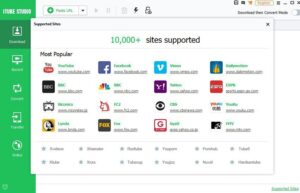
ITube HD Video Downloader is the greatest programme for downloading HD videos from over 10,000 different video sources, including YouTube. You can now take full HD clips with a URL and plugin using this YouTube batch downloader.
Features:
- UHD, 4K, 1080P, and other video formats are available.
- It allows you to save several videos at once.
- You can download media files three times faster.
- A built-in media player allows you to watch videos.
- This playlist can be downloaded in its original format.
- Windows or Mac are supported platforms.
12. YouTubNow

YouTubNow is a cloud-based tool that makes it simple to download a YouTube playlist login. It includes a search engine that allows you to look for video.
Features:
- It enables you to save an unlimited number of videos.
- MP4, 3GP, and WebM are among the export formats available.
- There is no need to register to utilise the tool.
- It’s compatible with Chrome, Firefox, Opera, and Safari.
- Web and Android are supported platforms.
13. DVDVideoSoft

DVDVideoSoft is a piece of software that allows you to download videos for offline viewing. It makes it simple to convert the videos you’ve downloaded. You can save clips among subtitles with this application.
Features:
- You can save a lot of videos at once.
- It enables you to download videos in their original format.
- This programme allows you to open lists with links from any text file.
- Android, Mac, and Windows are all supported systems.
14. FastestTube

FastestTube is a YouTube playlist downloader that is quick and easy to use. Downloading UltraHD and HD videos is supported by the app. This utility removes advertisements from YouTube videos.
Features:
- It has the ability to stop clips from starting automatically.
- Safari, Chrome, Opera, Internet Explorer, and Firefox are all supported.
- The annotations on videos can be removed using this web-based programme.
- Web is one of the platforms that is supported.
15. aTube Catcher
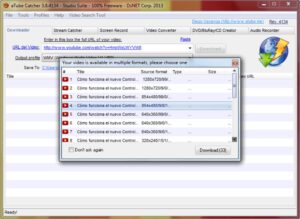
An aTube Catcher is an application that allows you to save your favourite YouTube playlist to your computer. This tool allows you to manage your computer and broadband resources.
Features:
- It has a straightforward, step-by-step user interface.
- MOV, WMA, WMV, and OGG are among the supported formats.
- Without the use of any other software, this application can burn your DVD/VCD.
- It allows you to save multimedia content on your computer or mobile device.
- Windows is the only platform that is supported.
16. Aimersoft iTube HD Video Downloader
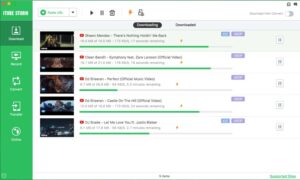
The best tool for downloading YouTube playlists in HD is Aimersoft. The software offers a turbo option that allows you to store films more quickly. It allows you to download videos from over 10,000 video sites.
Features:
- Download many videos at once.
- It allows you to save a YouTube playlist with a single mouse click.
- It offers an easy-to-use UI.
- Windows and Mac are supported platforms.
17. DownloadHelper

Video DownloadHelper is a Chrome plugin that allows you to save YouTube playlist video downloader to your computer. HLS is aided by the system (HTTP Live Streaming).
Features:
- You may watch videos on DASH (Dynamic Adaptive Streaming over HTTP).
- This allows video files to be named.
- To hide advertisements from videos, you can add a website to the blacklist.
- Multiple downloads can be managed.
- Filtering options are available.
- This download YouTube online playlist downloader has a user interface that may be customised.
- Saved videos can be converted to any format.
- Video DownloadHelper is compatible with Mac, Windows, and Linux computers.
18. VideoProc
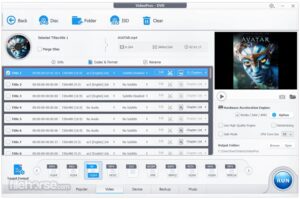
VideoProc works with YouTube download online and a variety of other audio and video media sites. The software allows you to download videos. This online YouTube playlist downloader free allows you to convert videos to MP4 and MP3 codecs.
Features:
- VideoProc also allows you to look up matched subtitle scripts for TV shows and movies online.
- It allows you to download a video playlist from over 1000 different websites.
- The proxy server can download videos using this YouTube playlist downloader free.
- Downloaded video can be converted to MP4, MP3, and iPhone formats.
- Windows and Mac are supported platforms.
19. WinX YouTube Downloader

WinxDVD is the greatest online YouTube playlist downloader, allowing you to download multiple videos at once. After installation, the tool is free of advertisements. You can save videos in MP3, MP4, WebM (audiovisual media), and FLV formats with WinxDVD (Flash Video).
Features:
- This allows you to download videos in up to 8K resolution.
- It also helps you download videos from your “Watch Later” queue.
- You can select a resolution in the app.
- It enables you to save high-definition videos.
- It’s very possible that you’ll be downloading large videos in batch mode.
- Windows and Mac are supported platforms.
20. Videoder

Videoder is the best online YouTube playlist downloader that aids in the development of your video collection. This YouTube mp4 downloader online lets you download 4K UltraHD videos in bulk.
Features:
- You can use it to download videos from over 50 different websites.
- Clips can be saved in bulk.
- It includes a link detection tool.
- At night, the download YouTube to mp4 playlist downloader is easier to use.
- The theme can be changed.
- Windows, Mac, and Android are all supported platforms.
FAQ:
❓ What is YouTube Playlist Downloader?
Video downloads in bulk are possible with YouTube playlist downloaders. This includes both offline videos and a playlist that has been generated privately. Many tools are available to let you download videos from YouTube in a variety of formats, including MP3 and MP4. They will enable high-quality video while also saving you time.
✔️ How to create a YouTube playlist?
To make a YouTube playlist, use the steps below:
Step 1: Make sure you’re signed into YouTube on your mobile browser or computer.
Step 2): Select the video that needs to be added to the playlist.
Step 3): Underneath the video, click the “Add to” button.
Step 4): From the dropdown menu, choose “make new playlist.”
Step 5): Type the name of the playlist and choose the privacy settings.
Step 6): Choose “Create” from the drop-down menu.
❓ What are the benefits of a YouTube Playlist Downloader?
The following are the main features of YouTube Playlist Downloader:
- Various video formats, such as mov, Avi, mp4, Mkv, and others, can be converted.
- Multiple websites are supported.
- This device includes a built-in player for playing downloaded videos.
- Breakpoint resume is supported.
- You can look at the history of downloads.
- It enables you to save an unlimited number of videos.




